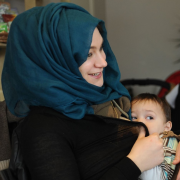Ethics Extravaganza 2018

Ethics Extravaganza 2018
June - July 2018
Our 4th online ethics conference
Photo credit: Paul Carter, We Do It In Public. Used with permission.
Ethics Extravaganza 2018 was made up of E CERPs presentations from our conferences in the previous 18 months and two brand new presentations by Zainab Yate. iLactation offered 5.25 E CERPs for IBCLCs around the world to help satisfy the requirement for a minimum of 5 E CERPs on ethics and related topics for IBCLC recertification.

Normative ethics & lactation: what came before autonomy and consent?
Zainab Yate, BSc, MSc - Read moreNormative ethics & lactation: what came before autonomy and consent?
Zainab Yate, BSc, MSc
Zainab Yate is a Biomedical Ethicist, Vice Chair and named qualitative lead on a pediatric flagged Research Ethics Committee Panel for the Health Research Authority (HRA) in the UK, for over a decade. Her working background is in Public Health and Commissioning with a Primary Care Trust for the National Health Service (NHS) in the UK. She is also a member of Kings College London Ethics Governance, Policy & Operations Committee (KCL). She has been a volunteer breastfeeding peer supporter with the NHS for a number of years and is the owner-author of the resource site for mothers and healthcare practitioners on Breastfeeding / Nursing Aversion and Agitation (BAA), www.breastfeedingaversion.com, where she researches and writes for the viewers of this site, to try to understand what aversion is and why it arises. She also volunteers to support the work of the World Breastfeeding Trends initiative in the UK (WBTi), a key tool to inform policy and change for all infant feeding partners and government bodies.
Normative ethics & lactation: what came before autonomy and consent?
Ethics provides a framework for making the best possible decision in situations where a dilemma has arisen, many of us make an ethical decision on a daily basis but do we know about the major moral theories that underpin ethical practice?
This lecture will give an overview of the main normative theories, including consequentialism, deontology, & virtue ethics and introduces the 4 principles approach that has been adopted in healthcare settings. I invite participants to look at which theory they are more drawn to, and what underlies their assumptions, positions and decisions. The use of case studies will help illustrate the complexity of a breastfeeding mother’s position and of our roles in assisting them. We will explore some common moral-based assumptions and positions with regard to formula, for both lactating mothers and health care professionals, and ask if using these ethical theories as healthcare professionals can frame the assessments of harm and risk in using breastmilk substitutes to ‘change’ the conversation about formula. We will also consider the case of a mother who struggles with severe breastfeeding aversion and agitation, in the lack of any evidenced-based treatment or practice, we look at why something like using ethical frameworks matter.

Global action towards nutrition improvement: progress, challenges and recommendations
Roger Mathisen, MSc, RD - Read moreGlobal action towards nutrition improvement: progress, challenges and recommendations
Roger Mathisen, MSc, RD
Roger Mathisen is an international nutritionist with more than 18 years of experience working in non-governmental organizations, the United Nations, academic institutions and the private sector. At Alive & Thrive, he provides program and technical leadership, management, and coordination of Alive &Thrive activities in Cambodia, Indonesia, Lao PDR, Myanmar, Thailand, Viet Nam, and the Philippines. Before joining Alive &Thrive, Roger worked as a nutrition specialist for UNICEF in Malawi and Viet Nam from 2004-2014, and provided technical capacity and emergency support in Ethiopia, Zimbabwe, Sri Lanka, Myanmar, and the Philippines. He has a Master of Science in Clinical Nutrition from the University of Oslo and continuing education from University of Ulster, Harvard Business Publishing and the London School of Hygiene and Tropical Medicine in Applied Nutrition, Research Design, Organizational Management and Health Policy and Financing. Roger is based in Hanoi, Viet Nam.
Global action towards nutrition improvement: progress, challenges and recommendations
In this presentation, Roger Mathisen from Alive & Thrive will guide you through global policy actions to improve nutrition since the Comprehensive Implementation Plan on Maternal, Infant and Young Child Nutrition was endorsed by the 65th World Health Assembly in 2012. You will be updated on key events, and evidence generated the last 5 years leading to increased commitments to nutrition by governments and development partners. You will also learn more about some of the challenges identified and currently hindering progress to reach the World Health Assembly targets by 2025 and related Sustainable Development Goals by 2030. The presenter will also summarize some specific recommendations from the Global Nutrition Report to accelerate progress towards the global targets as we enter the United Nations Decade of Action for Nutrition.

Cybernetic communication: media, ethical concerns, and guidance for lactation specialists
Lourdes Santaballa, BA(Hons), MS, IBCLC - Read moreCybernetic communication: media, ethical concerns, and guidance for lactation specialists
Lourdes Santaballa, BA(Hons), MS, IBCLC
Lourdes Santaballa is a community activist and organizer, having previously worked in the domestic violence, affordable housing, and economic equity movements. She has been active in the birth and breastfeeding community since the birth of her first child in 2006. A La Leche League leader since 2008, she co-founded La Leche League Puerto Rico in 2011 and has participated in the Global Leader Council as well acted as District Advisor to her area and her chapter treasurer. She is a birth and post-partum doula and prenatal educator and is a co-founder of the Colectiva Dar Vida, a birth and lactation cooperative providing services to families in Puerto Rico. An International Board Certified Lactation Consultant since 2011, she was the founder of the lactation program at sePARE, a community based municipal program in Vega Baja, providing coordinated services to low income families and helped draft its model lactation policy. Under her leadership the program was awarded the ILCA Care Award and received the Wilson-Clay Hoover Award for Research. The program was recognized for achieving a 76% exclusive breastfeeding rate among participants at six weeks. Lourdes received the notorious Drs. Ruth Lawrence and Audrey Naylor Legacy Scholarship in 2016 by the United States Breastfeeding Committee and is currently completing her Master’s Degree in Clinical Nutrition at the Maryland University of Integrative Health. Lourdes is a single parent to two children whom she nursed in tandem until the ages of 8 and 6 respectively and is active in online help communities both locally in Puerto Rico and globally. She is the Interim Chair to the Lactation Equity Action Committee, a joint committee committed to diversity and equitable representation in the IBCLC and lactation professions.
Cybernetic communication: media, ethical concerns, and guidance for lactation specialists
This presentation will discuss different ways in which cybernetic communication can be used by lactation specialists both personally and when working with clients and colleagues. it will detail the ethical concerns that may arise when using cybernetic media in the field of breastfeeding support and explain how the IBLCE Code of Professional Conduct for IBCLCs and the IBLCE Advisory Opinion: Professionalism In the Social Media Age provide guidance for the professional use of cybernetic media in the field of breastfeeding support.

Breastfeeding management and medical ethical issues
Khalid Iqbal, MD, IBCLC - Read moreBreastfeeding management and medical ethical issues
Khalid Iqbal, MD, IBCLC
Dr Khalid Iqbal is basically a clinician, currently working as a Neonatologist and Lactation Consultant in Neonatal Intensive Care Unit, Dubai hospital, Dubai Health Authority, Dubai United Arab Emirates. He has extensive experience in management of neonatal health and infant nutrition issues. He is a Lactation Consultant, BFHI Assessor and BFHI Trainer as well. He is a well-known speaker and had presentations on many topics at international platforms (ILCA, ABM, VELB, IBFAN, WABA) in USA, Germany, Australia, Malaysia, Indonesia, Egypt and Middle East countries.
He is affiliated with many regional and international organisations and contribute significantly in breastfeeding promotional activities and advocacy campaigns. He is a member IBFAN, Code Coordinator UAE Lactation Consultants Society. He is former Research Coordinator, World Alliance for Breastfeeding Action (WABA) Research Task Force, member of Academy of Breastfeeding Medicine (ABM). He is recipient of Regional Award for his Exemplary services for promoting, supporting and protecting breastfeeding in Arab World.
Dr Khalid is the author of many scientific papers either published in international journals or circulated online (recognized by UNICEF) and has written 3 books, Our Children are at Risk, The Basics of Human Lactation and Is it possible to re-establish breastfeeding once stopped?
Breastfeeding management and medical ethical issues
It is a fact that many health care professionals inadvertently undermine breastfeeding. Even a piece of bad advice from a clinician is enough to throw lactation completely off the track. In many cases, the breastfeeding failure is due to medical mismanagement. It must be realized that attitude and advice of health professionals are significant factors in the success or failure of breastfeeding. The consequences of the mismanagement can be serious health problems among infants.
Medical ethics emphasizes that medical professionals should practice medicine with good scientific and technical abilities focusing on reaching a right and good decision. Medical ethics is a system of moral principles that apply value and judgement to the practice of medicine.
We can conclude from many practical examples that a bad advice leading to lactation failure should be labelled as a medical malpractice. All medical professionals must be aware of the proven fact that even decreasing the dose of breastfeeding will increase the risk of morbidity and mortality in infants.

Avoiding conflict of interest in the area of infant and young child feeding
David Clark, JD - Read moreAvoiding conflict of interest in the area of infant and young child feeding
David Clark, JD
David Clark is an international lawyer working with the Nutrition Section, UNICEF, New York. Prior to that David worked for the United Nations Interregional Crime and Justice Research Institute in Rome, Italy. A native of Scotland, he began his career as an attorney with the Scottish Development Agency. Since 1995, David has assisted more than 60 countries in drafting legislation to implement the International Code of Marketing of Breastmilk Substitutes, and has been instrumental in bringing a human-rights based approach to the protection, promotion and support of breastfeeding. He has contributed to the development of international policy guidelines in the area of HIV and infant feeding and infant feeding in emergencies, and has provided guidance on issues around international trade agreements and intellectual property rights.
David has written and contributed to many articles and publications on health and nutrition policy, developed courses and training materials on the implementation of the International Code and maternity protection and has facilitated numerous workshops on the issue.
Avoiding conflict of interest in the area of infant and young child feeding
This talk will explain briefly the concept of conflict of interest, and how health professionals have been used in the past to promote the interests of commercial companies over those of their clients. It will explain how the World Health Assembly has gradually clarified the nature of conflict of interest in the context of IYCF and has recently provided helpful guidance that can assist health workers in avoiding conflict of interest.

Research ethics and infant feeding
Zainab Yate, BSc, MSc - Read moreResearch ethics and infant feeding
Zainab Yate, BSc, MSc
Zainab Yate is a Biomedical Ethicist, Vice Chair and named qualitative lead on a pediatric flagged Research Ethics Committee Panel for the Health Research Authority (HRA) in the UK, for over a decade. Her working background is in Public Health and Commissioning with a Primary Care Trust for the National Health Service (NHS) in the UK. She is also a member of Kings College London Ethics Governance, Policy & Operations Committee (KCL). She has been a volunteer breastfeeding peer supporter with the NHS for a number of years and is the owner-author of the resource site for mothers and healthcare practitioners on Breastfeeding / Nursing Aversion and Agitation (BAA), www.breastfeedingaversion.com, where she researches and writes for the viewers of this site, to try to understand what aversion is and why it arises. She also volunteers to support the work of the World Breastfeeding Trends initiative in the UK (WBTi), a key tool to inform policy and change for all infant feeding partners and government bodies.
Research ethics and infant feeding
Research ethics institutions protect the rights, safety, dignity, and well-being of research participants, and also have a duty to ensure ‘good’ research. This means research that can be completed, research that can stand up to scientific scrutiny, research that adds to the body of literature and can be used to benefit people and society. Conducting poor research is unethical, and there are many studies in the field of breastfeeding and lactation that have been challenged when published, simply because their findings and results are, at best, incorrect. Proper definitions, project design and industry conflict of interest are important factors, and these can be critiqued and challenged right at the beginning – at the ethical review stage. By scrutinising the research questions, the definitions of words used and even the research methodology we can, often quite quickly, decide if a study will have both scientific and ethical merit in the field of breastfeeding and lactation. If you are a donor, an applicant, a manager or a researcher you need to be aware of the process of ethical review of research protocols, the possibility of specialist review, and also of how to sift through published studies that have questionable study designs, and findings.


